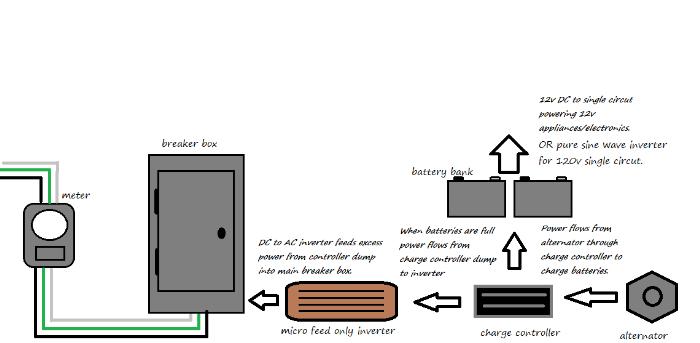
 3
3




Honest conversation is the most powerful of revolutionary actions.
 5
5




Invasive plants are Earth's way of insisting we notice her medicines. Stephen Herrod Buhner
Everyone learns what works by learning what doesn't work. Stephen Herrod Buhner

 3
3




I make a Maple Syrup instructional movie! Check it out HERE
SKIP books, get 'em while they're hot!!! Skills to Inherit Property
See me in a movie building a massive wood staircase:Low Tech Lab Movie








 1
1




Mike Haasl wrote:I'm a bit confused... I thought electricity usage was normally measured in KWhrs or Watt Hours or something like that. For instance 100 Watts of consumption for 10 hours would be 1000 watthours or 1 KWH.
So what is the 2000 watts they're talking about? Is it 2000 watts continuously? So you can have a small room heater going plus some lights, year round? Which is 48 kwh per day which is rather excessive.
Maybe I just have my units wrong or I misread their website.
 2
2





 2
2




How Permies works: https://permies.com/wiki/34193/permies-works-links-threads
My projects on Skye: The tree field, Growing and landracing, perennial polycultures, "Don't dream it - be it! "
 1
1




Jerry Brown wrote:I dunno if anyone has mentioned this here, if so please delete this or add a link to that one.
The 2000 Watt Society is an international educational non-profit. Probably organized some years ago in Europe. Has a US branch in Minneapolis. I joined, thinking they were going to help me decrease my average energy use to that amount (somewhat more than your usual 1500 Watt room heater, but not very much). What they are really after, I believe, is educating people in larger areas (cities, e.g.) about energy issues, and promoting large-scale energy down-sizing. As far as I know, they don't certify individuals' efforts. But in an area (a city, perhaps) they encourage energy conservation of many kinds, and _measure_ the results, on a city-wide scale. And eventually hope to certify that area/city when its total average energy use, including transport, decreases to 2000 watts per person.
As a side comment, Paul or someone could make an estimate of how much a person's average energy needs would be, who had instituted in her/his own life the conservation plans Paul espouses in _Building a Better World..._.
...Jerry Brown
Energy (J), Work done (kWh) and Power(kW): Try this web site for clarification openstax There are several basic physics and electrical education sites that may help. Techy types get frustrated when the wrong terms are used - be patient everyone!
 3
3




John Daley Bendigo, Australia The Enemy of progress is the hope of a perfect plan
Benefits of rainfall collection https://permies.com/t/88043/benefits-rainfall-collection
GOOD DEBT/ BAD DEBT https://permies.com/t/179218/mortgages-good-debt-bad-debt




I make a Maple Syrup instructional movie! Check it out HERE
SKIP books, get 'em while they're hot!!! Skills to Inherit Property
See me in a movie building a massive wood staircase:Low Tech Lab Movie
 1
1




Mike Haasl wrote:Thanks John, that makes sense. It also makes it really hard to asses one's wattage. I would think...




The best place to pray for a good crop is at the end of a hoe!

|
Brace yourself while corporate america tries to sell us its things. Some day they will chill and use tiny ads.
permaculture bootcamp - gardening gardeners; grow the food you eat and build your own home
https://permies.com/wiki/bootcamp
|

